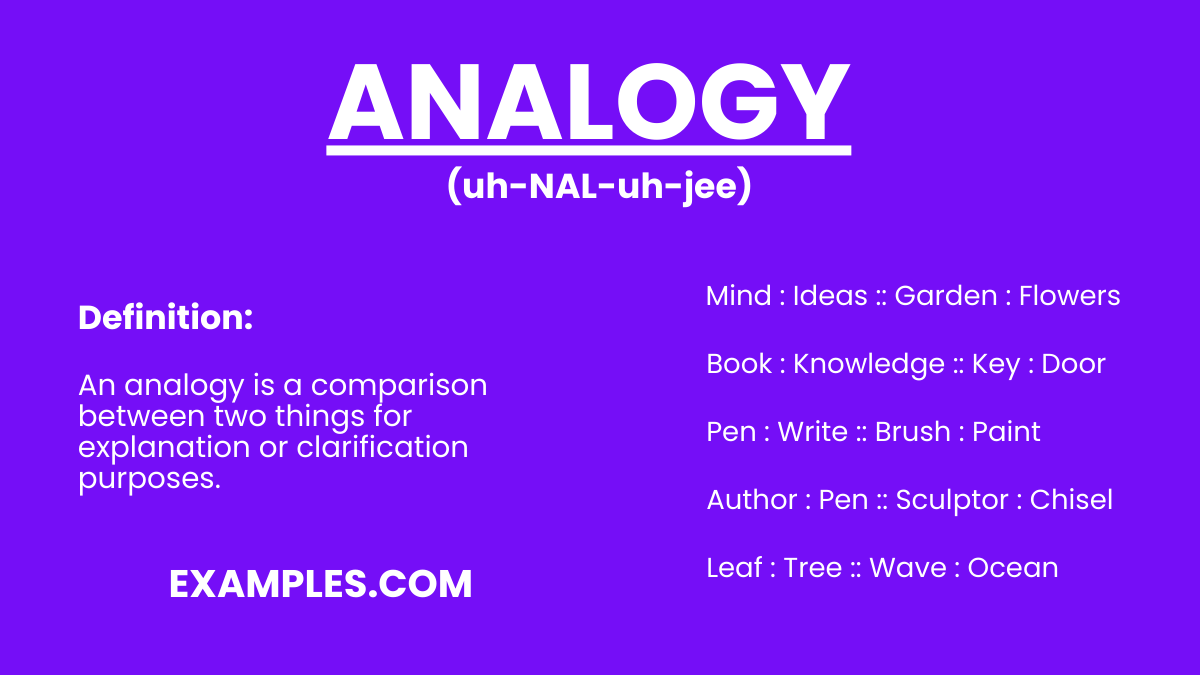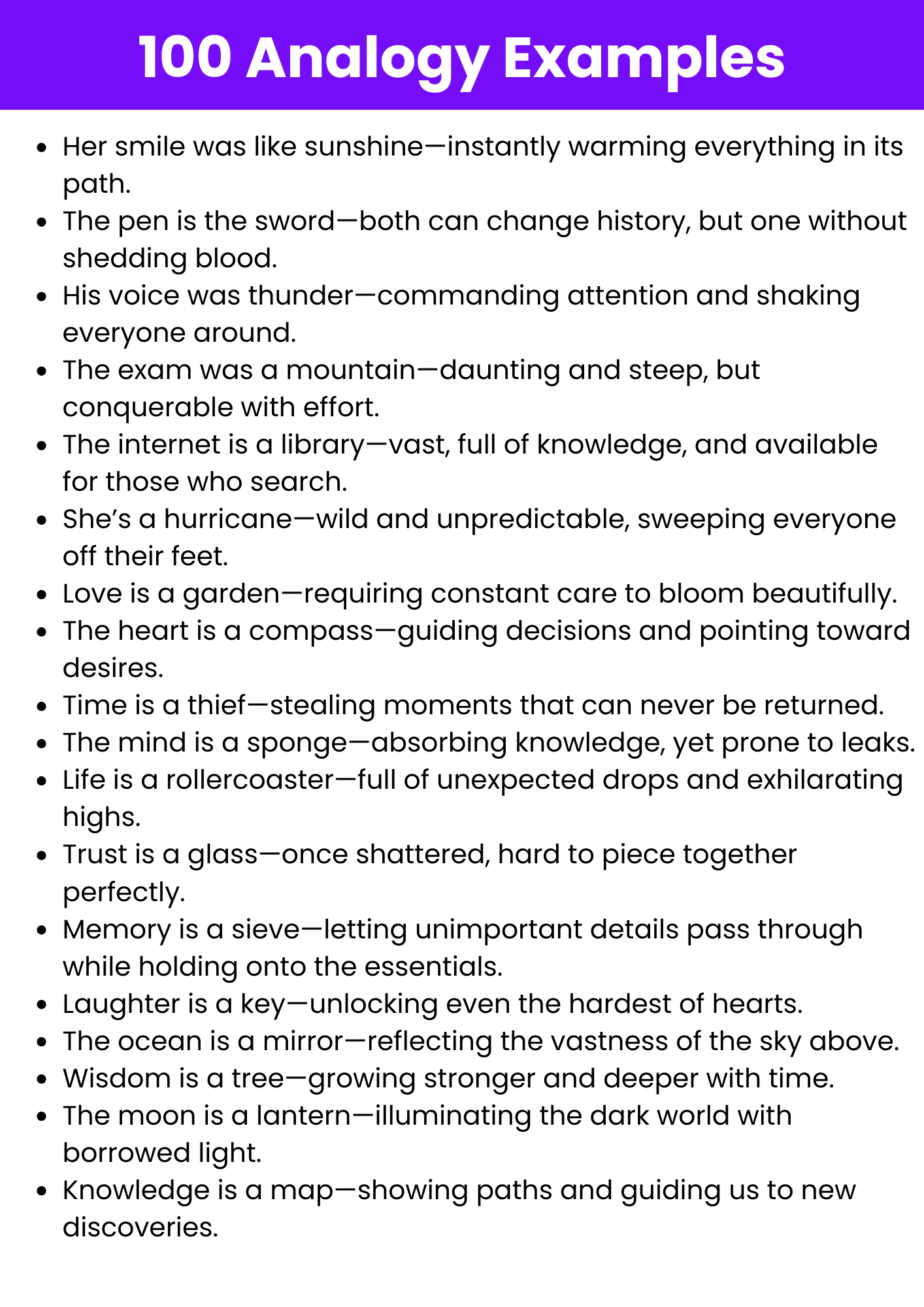Analogy
What is Analogy? – Definition
An analogy is a comparison between two things for the purpose of explanation or clarification. It highlights similarities between the two, making complex ideas easier to understand.

Generated Analogy Examples

Examples of Analogies
- Just as a sword is the weapon of a warrior, a pen is the weapon of a writer.
- Finding a good friend is like finding a rare gem.
- Learning a new language is like unlocking a door to a new world.
- Navigating life is like sailing a ship through stormy seas.
- Writing a book is like planting a garden.
- Time management is like juggling multiple balls in the air.
- Studying for exams is like preparing for a marathon.
- Her explanation was like a lighthouse guiding ships to shore.
- Teaching is like building a foundation for the future.
- Solving a problem is like untangling a knot.
- Managing a team is like conducting an orchestra.
- Her enthusiasm was like a burst of fireworks.
- His guidance was like the sun illuminating a dark path.
- Her passion was like a wildfire spreading through the forest.
- His thoughts were like clouds drifting across the sky.
- Capturing memories is like framing a photograph in your mind.
- Planning your day is like charting a course for a ship.
- Focusing on your goals is like zooming in on a distant object.
- Navigating challenges is like finding your way through a maze.
- The future is like a blank canvas waiting to be painted.
- Her determination is like a river carving through mountains.
- Building a career is like constructing a skyscraper, one floor at a time.
- Studying for exams is like preparing for a marathon; it requires endurance and consistency.
- Her guidance was like a lighthouse in a storm.
- Life is like a book, with each chapter bringing new experiences.
- Facing fears is like sailing through uncharted waters.
- Her support is like an anchor keeping me steady.
- His vision is like a beacon guiding us forward.
- Her resilience is like a sturdy mountain standing against the winds.
- His energy is like a lightning bolt, full of power and intensity.
Types of Analogies
Synonym Analogies
These analogies compare two words that have similar meanings.
- Happy : Joyful :: Sad : Melancholic
- Quick : Fast :: Smart : Intelligent
- Big : Large :: Small : Tiny
- Begin : Start :: End : Finish
- Brave : Courageous :: Fearful : Timid
Antonym Analogies
These analogies compare two words that have opposite meanings.
- Hot : Cold :: Light : Dark
- Happy : Sad :: Easy : Difficult
- Above : Below :: Enter : Exit
- Increase : Decrease :: Expand : Contract
- Young : Old :: Love : Hate
Part-to-Whole Analogies
These analogies relate a part of something to the entire object.
- Wheel : Car :: Leaf : Tree
- Page : Book :: Brick : Building
- Petal : Flower :: Room : House
- Finger : Hand :: Wing : Bird
- Engine : Train :: Heart : Body
Dead Analogies
Analogies that have been used so frequently they have lost their original impact and effectiveness.
- Life is like a journey.
- Time is money.
- Knowledge is power.
- The classroom is a factory.
- The world is a stage.
Mixed Analogies
Combining two or more incompatible analogies, often resulting in confusion or a humorous effect.
- We’ll cross that bridge when we sail into it.
- Don’t count your chickens before they hatch the plan.
- It’s not rocket surgery.
- We’ll burn that bridge when we come to it.
- He kicked the bucket of opportunity.
Absolute Analogies
Analogies that create a strong, clear, and direct comparison without any ambiguity.
- Her determination is like a beacon in the night.
- His mind is like a steel trap, quick and efficient.
- Her voice is like a soothing melody.
- His resolve is like an unbreakable chain.
- The project is like a well-oiled machine, running smoothly.
Visual Analogies
Analogies that create vivid images or visuals in the reader’s mind.
- A bridge connecting two islands symbolizes the connection between two ideas.
- A lighthouse standing tall against the storm represents unwavering guidance.
- A compass pointing north illustrates clear direction and purpose.
- A broken pencil lying on paper signifies incomplete ideas.
- A snowflake delicately landing on a windowpane mirrors unique moments in life.
How to Identify/Find Analogy?
To identify analogies, look for comparisons that explain or clarify a concept by highlighting similarities between two different things. Analogies often use words like “like” or “as” but can also be implied without them.
- Look for explicit comparisons using “like” or “as” or implicit comparisons that draw parallels.
- Identify the two things being compared and understand the similarities highlighted.
- Check if the comparison helps in explaining or understanding a complex idea.
- Notice if the analogy adds clarity or depth to the subject being discussed.
- Look for analogies that enhance the overall message or theme of the text.
How to Use Analogy?
Use analogies to make your writing more relatable and to clarify complex ideas. Ensure your analogies are relevant and enhance the reader’s understanding without being forced or overly complicated.
- Choose comparisons that resonate with your audience’s experiences and knowledge.
- Use vivid and specific imagery to make your analogy memorable.
- Integrate analogies smoothly into your narrative or argument to maintain flow.
- Ensure the analogy enhances the reader’s comprehension or emotional connection.
- Avoid overusing analogies to keep them effective and impactful.
Other Analogy Examples
Analogies in Daily Life
Daily life is filled with analogies that help us convey our thoughts, feelings, and experiences more clearly.
- His determination is like a mountain, unmovable and steadfast.
- Her explanation was like a beacon, guiding us through confusion.
- His ideas flow like a river, constant and dynamic.
- Her patience is like a calm sea, undisturbed by turmoil.
- The news spread like wildfire, reaching everyone swiftly.
Analogy Examples for Kids
Introduce children to the enchanting world of kid-friendly analogies with relatable comparisons like “learning is a treasure hunt” or “friendship is a warm blanket.”
- The clouds are like fluffy pillows in the sky.
- Her smile is like sunshine on a rainy day.
- The playground is like a jungle, full of adventures.
- His room is like a tornado, full of toys everywhere.
- The stars are like tiny diamonds sparkling in the night sky.
Analogy Examples for Students
Empower students with analogies that make learning engaging. Discover how “studying is like fueling the brain’s engine” and “creativity is a toolbox of colorful ideas.”
- Knowledge is like a light in the darkness, guiding us forward.
- The classroom is like a beehive, buzzing with activity and collaboration.
- Books are like keys that unlock the treasure chest of wisdom.
- Homework is like a mountain to climb; each assignment is a step towards the summit.
- The mind is like a powerful engine, driving creativity and problem-solving.
Analogy Examples for Poems
Rich and evocative analogies that enhance the beauty and imagery in poetic language.
- The night is like a velvet cloak enveloping the world.
- Hope is like a fragile feather, floating gently in the breeze.
- The sky is like a canvas painted with dreams.
- Words are like pearls strung together, forming a necklace of meaning.
- Silence is like a heavy blanket covering the room.
Hidden Personification Analogy Examples
Creative analogies that bring inanimate objects or nature to life by giving them human-like qualities.
- The sun smiled down on us, warming our spirits.
- The flowers danced in the gentle breeze.
- The ocean roared with anger during the storm.
- The fire licked the air hungrily, consuming everything in its path.
- The city never sleeps, bustling with activity day and night.
Analogy Examples About a Tree
Descriptive analogies that depict trees as more than just plants, highlighting their strength, beauty, and presence.
- The tree stands tall like a guardian watching over the land.
- The bark is like a warrior’s armor, protecting the tree from harm.
- The tree is like a silent sentinel, standing watch over the forest.
- The trunk is like a sturdy pillar, supporting the weight of the branches.
- The sap is like the tree’s lifeblood, nourishing every part of it.
Analogy Examples About Love
Passionate and expressive analogies that capture the intensity and essence of love in all its forms.
- Love is like a burning flame, warm and consuming.
- Love is like a rollercoaster ride, full of ups and downs.
- Love is like glue, holding us together through thick and thin.
- Love is like a storm, wild and unpredictable.
- Love is like a garden that needs care and attention to flourish.
Explore Other Literary Devices
Elevate Your AP English Preparation
Unlock your potential with our comprehensive AP English exam preparation tools designed to help you excel.
- Extensive Question Bank: Access 900+ exam-like questions for both AP English Language and Literature.
- Expertly Crafted: Questions mirror the structure and difficulty of actual AP exams, ensuring relevant practice.
- Detailed Explanations: Understand your mistakes with clear, concise breakdowns of correct and incorrect answers.
- Personalized Learning: Tailor your study sessions with topic-specific tests and adaptive learning tools.
- Comprehensive Coverage: Master all aspects of the AP English curriculum with extensive guides and resources.
Frequently Asked Questions
-
How is an analogy different from a metaphor?
While both compare two things, a metaphor states that one thing is another, whereas an analogy explains how two things are similar in specific ways. -
What are the types of analogies?
Common types include synonym analogies (similar meanings), antonym analogies (opposite meanings), part-to-whole analogies, and function analogies (how things work). -
How are analogies used in writing?
Analogies enhance understanding, add depth, and make complex ideas more relatable by linking them to familiar concepts. -
Can you provide an example of an analogy?
They help students grasp new or abstract concepts by relating them to known ideas, improving comprehension and retention. -
Why are analogies important in education?
They help students grasp new or abstract concepts by relating them to known ideas, improving comprehension and retention.

